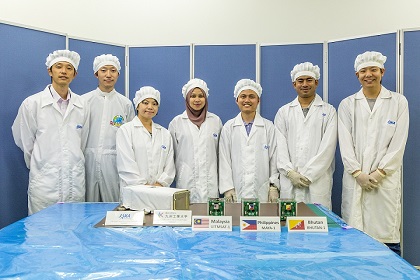This is an archive of information released in the past.
Disclaimer: It may contain broken links or outdated information. Some parts may not function in current web browsers.
*Visit https://humans-in-space.jaxa.jp/en/ for the latest information.

Experiment
- News
- Kibo Utilization Strategy
- Kibo Utilization Plan
- List of JAXA's Utilization Themes
- Experiment Facilities
- Space Environment Utilization
- Archive
CubeSats for BIRDS-2 handed over to JAXA. Launch preparations completed!
On May 15, 2018, three CubeSats designed and developed in Japan by students from Bhutan, the Philippines, and Malaysia were handed over to JAXA at the JAXA Tsukuba Space Center, and started loading preparations for their launch.
The CubeSats handed over this time are for the second round of the BIRDS Project* intended to deploy CubeSats from the Japanese Experiment Module "Kibo" in accordance with the strategic partnership agreement between JAXA and the Kyushu Institute of Technology, and are scheduled to be launched onboard the Dragon CRS-15 spacecraft (SpX-15) from Florida, USA.
In the BIRDS-2 programme participated by four countries (Japan, Bhutan, the Philippines, and Malaysia), each country except Japan developed a small cube satellite 10 cm on each side (called a CubeSat) for a total of three CubeSats--"BHUTAN-1" (Bhutan), "MAYA-1 (the Philippines)" and "UiTMSAT-1" (Malaysia). Bhutan is going to launch its first satellite.
*BIRDS project (Officially called the Joint Global Multi Nation Birds) is an international joint development and operations project of CubeSats, participated by the Kyushu Institute of Technology in Japan, and certain Asian and African nations. The three CubeSats handed over as mentioned above are for the second round of the programme.

Representatives of member countries participating in the BIRDS-2 mission and JAXA officials taking a commemorative photo in front of the JEM Small Satellite Orbital Deployer (J-SSOD) and the CubeSats (Credit: JAXA)
Related Links
*All times are Japan Standard Time (JST)
| Copyright 2007 Japan Aerospace Exploration Agency | Site Policy |